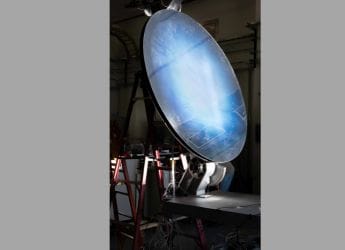- Home
- Transportation
- Transportation News
- Rivian Benefits From Markets' Thirst for Electric Automakers
Rivian Benefits From Markets' Thirst for Electric Automakers
Rivian’s IPO was the largest in the United States since 2014.

Also helping Rivian's case is that founder Robert Scaringe "chose wisely on his executive team"
Rivian's smashing entry into Wall Street, where its value soared higher than that of the traditional Detroit automakers, is confirmation of investors' voracious appetite for any company making electric vehicles.
The IPO was the largest in the United States since 2014, and even before its debut, Rivian had raised $11.9 billion (roughly Rs. 88.604 crore) in financing.
In its first day of trading, shares in the company backed by Amazon and Ford leapt as high as 50 percent, taking Rivian's market capitalization to more than $100 billion (roughly Rs. 7,44,578 crore), if stock options and other convertible shares are taken into account.
That was above General Motors and Ford itself, even though those companies produce millions of cars each year whereas Rivian is expected to deliver only 1,000 by the end of 2021, and has yet to make a profit.
The promising stock market debut has attracted comparisons between Rivian and Tesla, Elon Musk's electric vehicle phenomenon that recently passed the symbolic $1 trillion (roughly Rs. 74,45,786 crore) valuation mark.
Yet the road ahead for Rivian may indeed be bumpy. Fellow electric car start-ups Nikola, Canoo, Lordstown Motors, and Fisker all saw their shares peak when they went public in 2020, before falling back heavily. Lucid and China's XPeng have seen more stable share prices.
Tesla's experience may be most instructive. While its shares are valued around $1,077 (roughly Rs. 80,100) today, they were worth $6 (roughly Rs. 450) just 10 years ago.
Scaling up
The rising interest in electric cars comes as investors sensitive to environmental or social issues increase demand for green companies.
Adding to the positive sentiment are moves by Washington to increase the availability of electric vehicle charging stations and encourage people to switch from fossil-fuel burning cars.
The electric vehicle sector remains tiny, comprising just three percent of all sales in the United States, yet it has benefited from this attention, which has not escaped the notice of traditional automakers.
"When General Motors says that by 2035 all of its cars will be electric, the hope for a rapid electrification of the sector is enormous," said Gregori Volokhine, president of Meeschaert Financial Services.
For GM chief executive Mary Barra, the astronomical valuations of electric vehicle startups that have sold little to no cars shows that her company, which has planned to invest more than $35 billion (roughly Rs. 2,60,615 crore) in electric and autonomous vehicles by 2025, is "so undervalued."
"If anything, it motivates me to work even harder," she said at a conference Wednesday.
The Detroit automakers' transition to electric fleets will take time, while with Rivian, "investors have a pure electric player on hand," Volokhine said.
Excellent entourage
Also helping Rivian's case is that founder Robert Scaringe, a car enthusiast who started the company right out of school, "chose wisely on his executive team," which is stacked with auto industry connoisseurs, said Karl Brauer, an analyst at iseecars.com.
From their design to their interiors and options, Rivian's products are convincing, said Brauer, who was able to test the company's R1T pickup truck himself.
The model's high price of at least $67,500 (roughly Rs. 50.26 lakh) should not prevent it from finding its audience, just as Tesla has been able to target the high-end market, Brauer said.
Perhaps most important for Rivian are its partnerships with Ford and Amazon.
In addition to owning about a fifth of the company, Amazon has placed an order for 100,000 of the company's delivery vans by 2030.
Ford, meanwhile, owns about 12 percent of Rivian's stock and has a vested interest in its growth.
With after-sales maintenance usually a weak point of auto start-ups, "Ford could come out with a statement in the next two months to two years saying there are going to have dedicated dealers that will also be fully capable of servicing the Rivians," Brauer said.
To Jay Ritter, an IPO specialist at the University of Florida, the enthusiasm of investors who have paid so much for a company that has thus far delivered so little is "surprising."
But he said that with the money raised, Rivian will be able to hire engineers and increase production, bringing it closer to markets' lofty expectations.
Get your daily dose of tech news, reviews, and insights, in under 80 characters on Gadgets 360 Turbo. Connect with fellow tech lovers on our Forum. Follow us on X, Facebook, WhatsApp, Threads and Google News for instant updates. Catch all the action on our YouTube channel.
Related Stories
- Samsung Galaxy Unpacked 2026
- iPhone 17 Pro Max
- ChatGPT
- iOS 26
- Laptop Under 50000
- Smartwatch Under 10000
- Apple Vision Pro
- Oneplus 12
- OnePlus Nord CE 3 Lite 5G
- iPhone 13
- Xiaomi 14 Pro
- Oppo Find N3
- Tecno Spark Go (2023)
- Realme V30
- Best Phones Under 25000
- Samsung Galaxy S24 Series
- Cryptocurrency
- iQoo 12
- Samsung Galaxy S24 Ultra
- Giottus
- Samsung Galaxy Z Flip 5
- Apple 'Scary Fast'
- Housefull 5
- GoPro Hero 12 Black Review
- Invincible Season 2
- JioGlass
- HD Ready TV
- Latest Mobile Phones
- Compare Phones
- Leica Leitzphone
- Samsung Galaxy S26+
- Samsung Galaxy S26 Ultra
- Samsung Galaxy S26
- iQOO 15R
- Realme P4 Lite
- Vivo V70
- Vivo V70 Elite
- Asus TUF Gaming A14 (2026)
- Asus ProArt GoPro Edition
- Huawei MatePad Mini
- Infinix Xpad 30E
- Huawei Watch GT Runner 2
- Amazfit Active 3 Premium
- Xiaomi QLED TV X Pro 75
- Haier H5E Series
- Asus ROG Ally
- Nintendo Switch Lite
- Haier 1.6 Ton 5 Star Inverter Split AC (HSU19G-MZAID5BN-INV)
- Haier 1.6 Ton 5 Star Inverter Split AC (HSU19G-MZAIM5BN-INV)
















